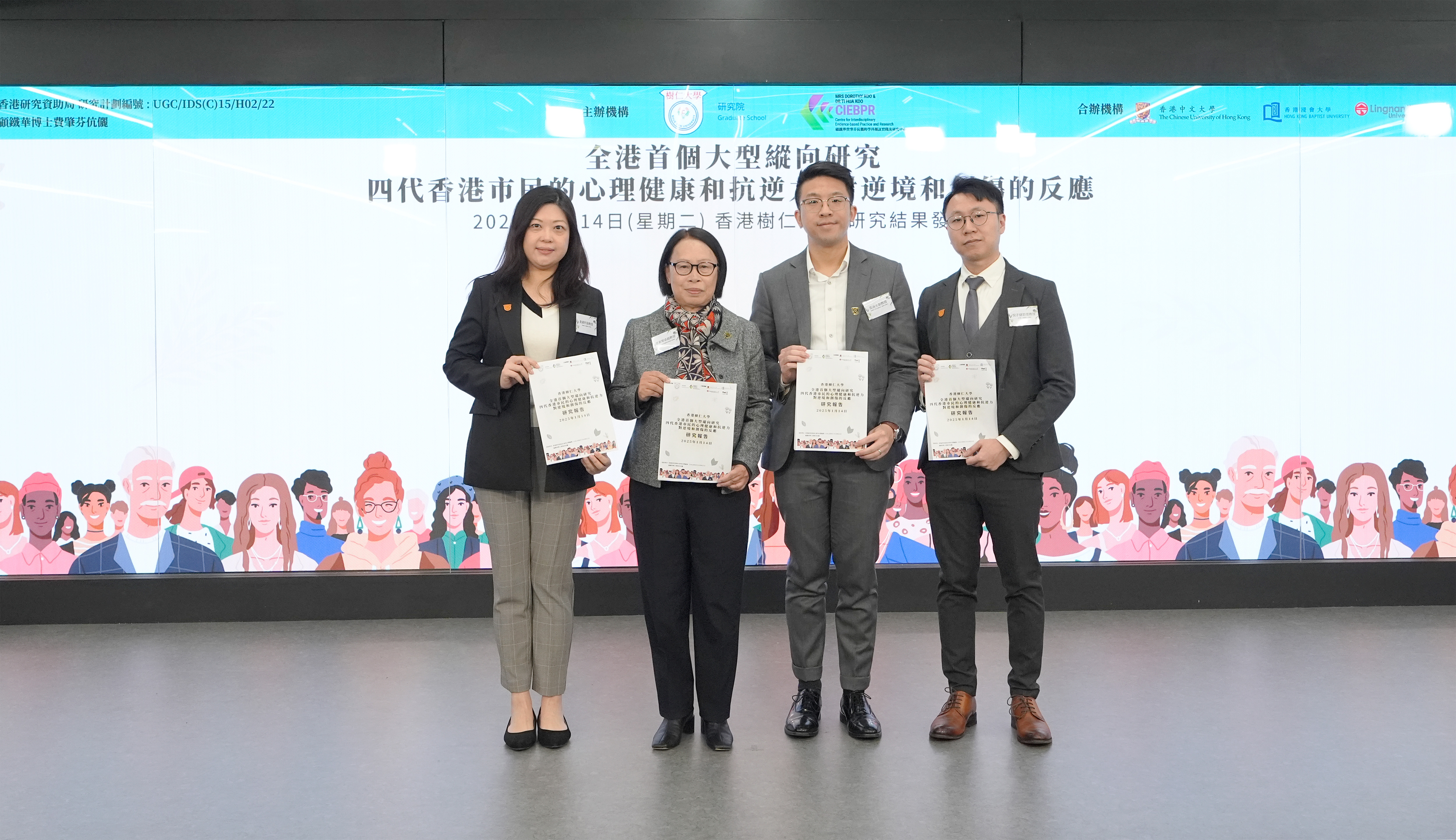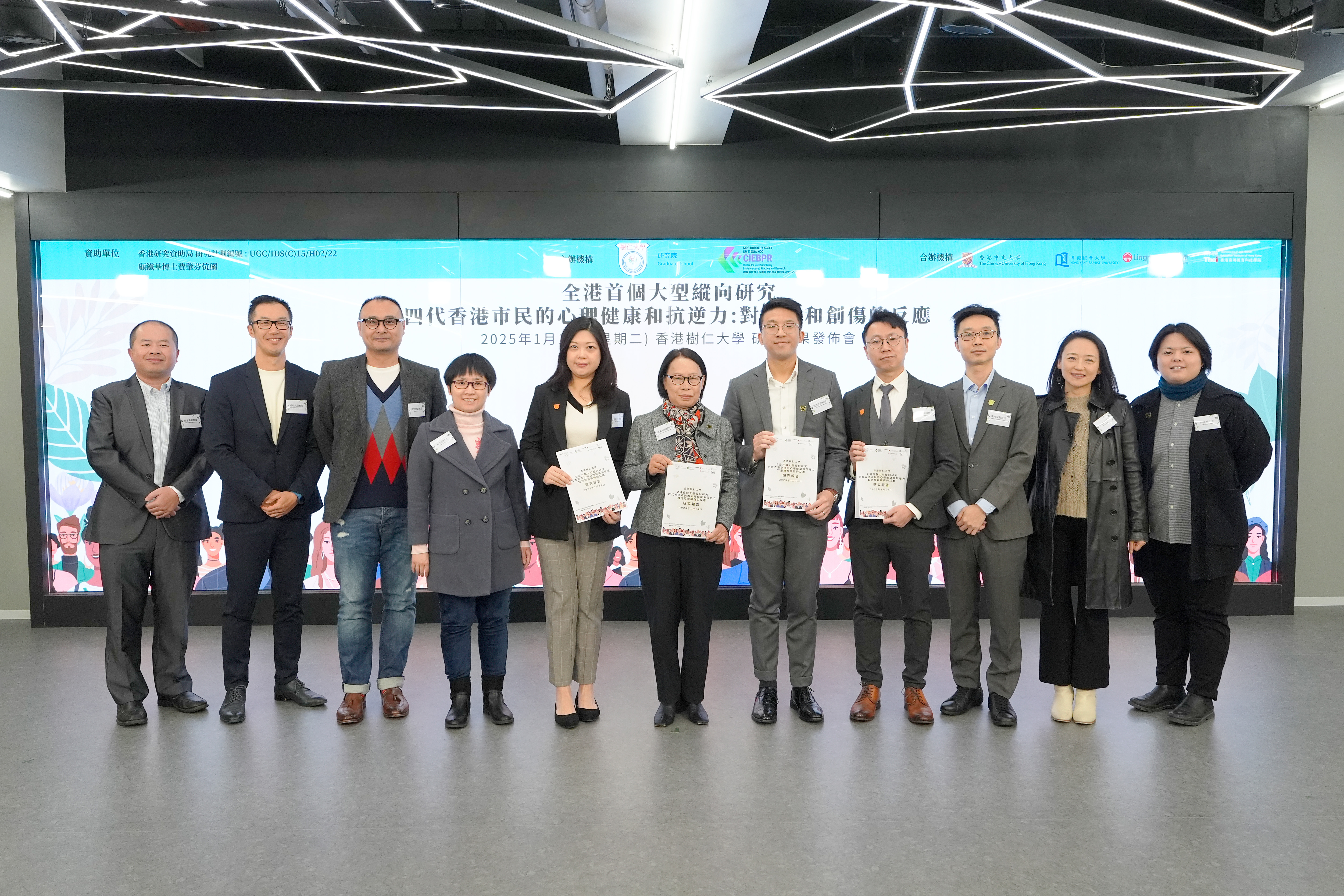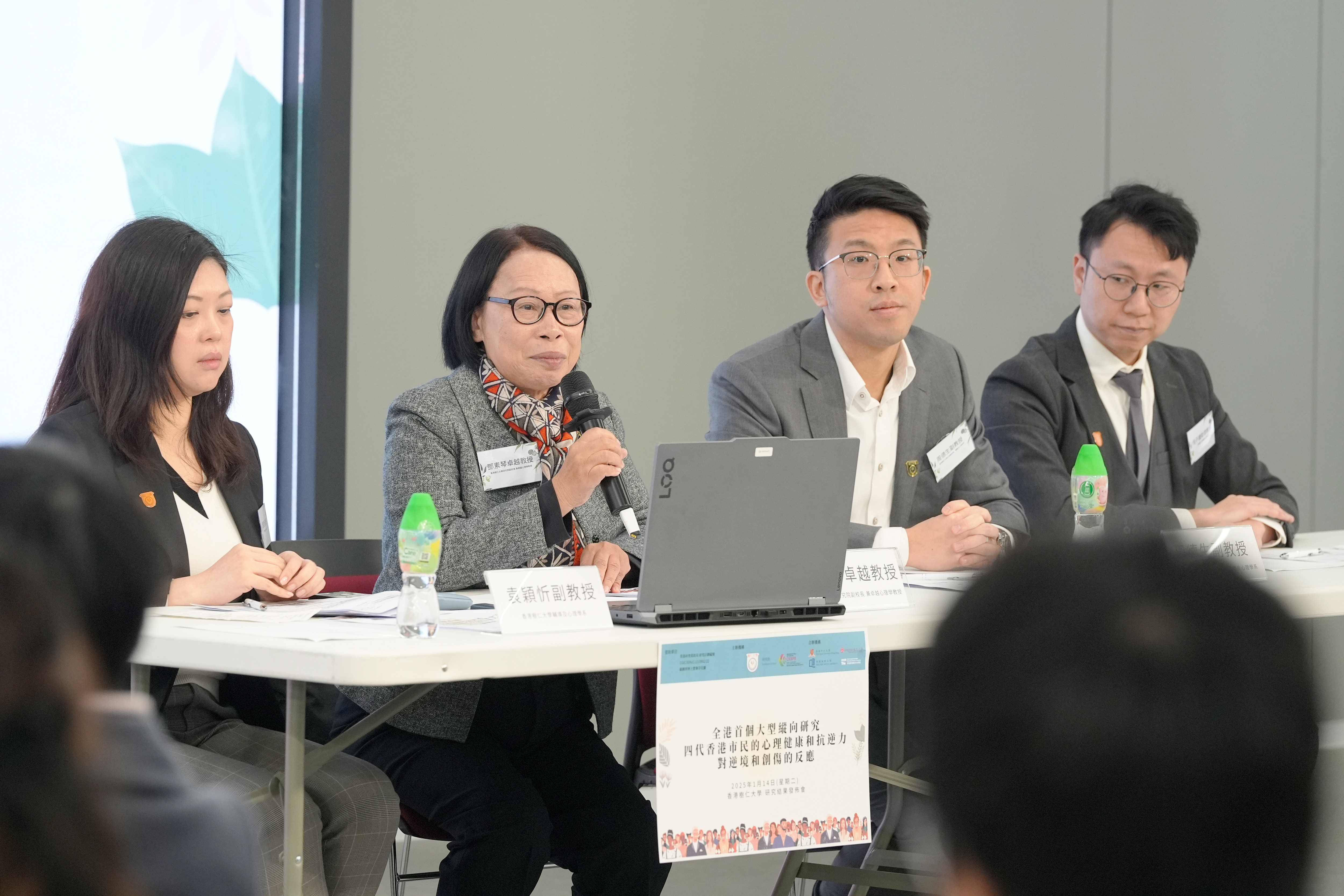Largest Psychological Trauma Study in Hong Kong One in Three Gen Z Report Symptoms of Anxiety
Hong Kong Shue Yan University (HKSYU) Mrs Dorothy Koo and Dr Ti Hua Koo Centre for Interdisciplinary Evidence-Based Practice and Research, in collaboration with four other institutions, has conducted "The first large-scale longitudinal study in Hong Kong—The mental health and resilience of four generations of Hong Kong citizens: Responses to adversity and trauma". Research data shows significant differences among generations regarding mental health symptoms and their associations with traumatic events.
Gen Z, defined as young adults aged 18 to 27, are the group most severely affected by anxiety, depression, and post-traumatic stress symptoms despite having fewer lifetime and current trauma compared to other generations. Their emotional regulation skills, positivity towards life are also lower than those of other generations. Our society must pay more attention to the personal and family resilience of the younger generation and support their mental health.
This project was funded by the University Grants Committee and Mrs Dorothy Koo and Dr Ti Hua Koo. This is the first report from a large interdisciplinary longitudinal research project conducted by Hong Kong Shue Yan University, The Chinese University of Hong Kong, Hong Kong Baptist University, Lingnan University, and the Technological and Higher Education Institute of Hong Kong. The research aims to explore and track the resilience of Hong Kong adults in adapting to changes, trauma, and adversity. The first phase of the study was conducted from 2023 to 2024 and surveyed 10,136 people to understand their mental health symptoms, and rates of trauma and adversity. The study found that 21.9%, 20.7%, and 17.4% of the Hong Kong population reported symptoms of stress, anxiety, and depression, respectively.
The research analysed four different generational groups:
• Baby Boomers (ages 60 to 74)
• Generation X (ages 44 to 59)
• Generation Y (ages 28 to 43)
• Generation Z (ages 18 to 27)
Among them, 22.8%, 30.5%, and 22.3% of Gen Z young people reported symptoms of stress, anxiety, and depression respectively. The rates of anxiety and depression symptoms among Gen Z are significantly higher than those of other age groups, and their scores on emotional regulation, and positive life outlook are also lower than those of other generations. These results are concerning.
Professor TANG So Kum Catherine, Vice President (Graduate School) and Distinguished Professor of Psychology at HKSYU, said, “The research shows that the resilience of the young generation is significantly lacking compared to previous generations, which is very concerning. The results align with international trends, indicating this is a global issue. We call on all sectors of society to pay attention to the mental health and resilience of young people and to provide support. Otherwise, this situation will have long-term implications for the health of Hong Kong society."
The research team expects to release a second report in two years.
Significant Link Between Trauma and Mental Health
Aside from mental states, the study also examined the traumas faced by various generations. The categories of major trauma include: serious traffic accident, serious work/home accident, physical violence, sexual violence, fatal illnesses or serious injuries, loss of loved ones or divorce, witnessing death or injury, and childhood violence.
In the past year, the top three traumatic events experienced by Hong Kong citizens were: 19.2% witnessed death or injury, 10.6% experienced the loss of loved ones or divorce, and 7.1% experienced physical violence.
The research indicates a significant link between trauma and mental health, with groups that have experienced trauma and adversity showing higher levels of stress, anxiety, and depression symptoms.
Gen Z generally experiences fewer traumas compared to other generations. 16.8% of Gen Z reported witnessing death or injury events in the past year, and 7.7% experienced the loss of loved ones or divorce. Additionally, 12% of Baby Boomers and 9.4% of Gen Z reported experiencing violence in the past year, which is higher than the average. This is a cause for concern.
Dr YUEN Wing Yan Winnie, Associate Professor of the Department of Counselling and Psychology at HKSYU, said, “Nearly 10% of Gen Z young people reported experiencing violence in the past year. Parents and teachers must pay extra attention to provide a safe environment for young people."
Importance of Cultivating Resilience
The study also highlights key protective and resilience factors that can mitigate the impact of trauma. The findings indicate that symptoms of stress, anxiety, and depression are influenced by adversity and trauma, making it vital to actively cultivate resilience at both personal and family levels to alleviate the mental health burdens.
Among several resilience factors, emotional regulation emerged as the most significant one. Data shows that individuals lower anxiety or depression symptoms have notably higher levels of emotional regulation.
Dr CHOW Tak Sang Jason, Vice President (University Administration), Associate Professor at Department of Counselling and Psychology, said, “The research indicates that personal and family factors can serve as important factors for mental health. Specifically, for those who have experienced trauma and adversity, individual resilience, emotional regulation, family resilience, and a positive outlook on life are key protective factors."
All in all, this research emphasizes the need for Hong Kong to provide specific support to individuals across different generations to enhance their coping mechanisms, such as increasing their individual resilience and emotional regulation, and strengthen family support systems, so as to improve crossgenerational mental health. Special attention should also be given to the mental health challenges faced by Gen Z.
Specifically, the research team recommends that social emotional education and resilience training should be incorporated into school curriculum and corporate training programs. Schools should enhance psychological counseling to identify difficulties faced by young people and help them cope with adversities. Carers and family members of elderly should remain vigilant to detect any signs of violence against the elderly as early as possible.




The research was funded by the University Grants Committee and Mrs Dorothy Koo and Dr Ti Hua Koo, and conducted by Hong Kong Shue Yan University, The Chinese University of Hong Kong, Hong Kong Baptist University, Lingnan University, and the Technological and Higher Education Institute of Hong Kong.
Related media coverage:
Yahoo
https://hk.news.yahoo.com/z%E4%B8%96%E4%BB%A3%E6%AF%8F3%E4%BA%BA%E6%9C%891%E4%BA%BA%E6%84%9F%E7%84%A6%E6%85%AE-%E5%9C%98%E9%AB%94%E5%80%A1%E7%B4%8D%E6%83%85%E7%B7%92%E6%95%99%E8%82%B2%E5%85%A5%E5%AD%B8%E6%A0%A1%E8%AA%B2%E7%A8%8B-043015158.html
Topick
https://topick.hket.com/article/3887138
On.cc
https://hk.on.cc/hk/bkn/cnt/news/20250114/bkn-20250114123015642-0114_00822_001.html
WWP
https://www.wenweipo.com/a/202501/14/AP6785d927e4b0a8df50635502.html
SCMP
https://www.scmp.com/news/hong-kong/society/article/3294734/1-3-gen-z-hongkongers-struggle-anxiety-study-finds?utm_source=rss_feed
In media
https://www.inmediahk.net/node/%E6%94%BF%E7%B6%93/%E6%A8%B9%E4%BB%81%E7%A0%94%E7%A9%B6%E6%8C%87%E4%B8%89%E6%88%90%E3%80%8Cz%E4%B8%96%E4%BB%A3%E3%80%8D%E7%84%A6%E6%85%AE-%E5%9C%A8%E5%90%84%E5%B9%B4%E9%BD%A1%E5%B1%A4%E4%B8%AD%E6%9C%80%E9%AB%98
NOW
https://news.now.com/home/local/player?newsId=590024
Instagram
https://www.instagram.com/p/DEzPrPKtu-m/?igsh=ZDljOTJjN3Y1c2I4
MingPao
https://news.mingpao.com/ins/%E6%B8%AF%E8%81%9E/article/20250114/s00001/1736834650764/%E7%B2%BE%E7%A5%9E%E5%81%A5%E5%BA%B7%E7%A0%94%E7%A9%B6%E6%8F%ADz%E4%B8%96%E4%BB%A3%E7%84%A6%E6%85%AE%E6%8A%91%E9%AC%B1%E5%9A%B4%E9%87%8D-%E4%BF%83%E5%8A%A0%E5%BC%B7%E6%94%AF%E6%8F%B4
HKCD
http://www.hkcd.com.hk/hkcdweb/content/2025/01/14/content_8676316.html
RTHK 千禧年代
https://www.rthk.hk/radio/radio1/programme/HK2000
|